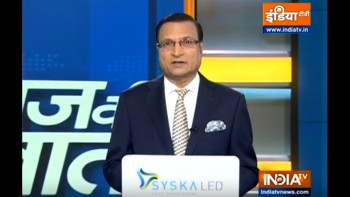 With the passing away of former President Pranab Mukherjee, the nation has lost a stalwart who, by sheer dint of merit, rose from common ranks to the highest constitutional position and earned the respect of his peers.
With the passing away of former President Pranab Mukherjee, the nation has lost a stalwart who, by sheer dint of merit, rose from common ranks to the highest constitutional position and earned the respect of his peers.
A strict disciplinarian, Pranab Da, as he was fondly called, had an elephantine memory and encyclopaedic knowledge about history, law, parliamentary practice, finance and political science.
Born in a poor family in West Bengal, he used to walk nearly 10 kilometres daily to attend school. Pranab Da remained in politics for 50 years. He entered politics by joining Ajoy Mukherjee’s Bangla Congress in 1967, caught the eye of then Prime Minister Indira Gandhi and joined Congress. He became a member of Rajya Sabha in 1969 and continued to remain member of the Upper House till 2002. In 2004, he contested Lok Sabha election from West Bengal and won.
The nation elected him President in 2012, and in 2019 the Modi government bestowed him with highest civilian honour, Bharat Ratna. To honour an erudite person like Pranab Da, is to enhance the prestige of this award. A Congressman to the core, Pranab Da left all political leanings after he became the President. He always used to encourage new ideas, new suggestions and fresh experiments.
In 2018, when Pranab Da was invited by the RSS to address its annual function in Nagpur, there was a political storm. Nevertheless he went to the event, heard the RSS chief speak, and expressed his opinion on issues of national interest. Pranab Da also guided Prime Minister Narendra Modi on how to strengthen the economy and work for the betterment of the poor.
On Monday, when news broke about Pranab Da’s passing away, Modi was among the first to react on Twitter. He posted a photograph of him touching the feet of Pranab Da. This image conveyed the extent of respect Modi had towards the former President. Whenever the PM needed guidance on any important matter, his cavalcade of cars always headed either to Rashtrapati Bhawan or to the former President’s house.
My first acquaintance with Pranab Da was soon after the Emergency was over. Whenever I met and talked with him, I always used to gain some knowledge from him. He was my guest in ‘Aap Ki Adalat’ show twice. I asked him some uncomfortable questions, but he never took umbrage. He always used to tell me, you should ask questions which the people want to ask. When ‘Aap Ki Adalat’ completed 21 years, Pranab Da attended the event as President, while Narendra Modi attended as Prime Minister. I still remember what Pranab Da told me publicly. Those words still ring in my ears.
He said, ‘Rajat told us that in this program, he became the prosecutor without having legal degree or licence to argue in court. That is not necessary Rajat, because 125 crore people of this country have appointed you as public prosecutor, and you should go on prosecuting the persons against whom you find something wrong has been done, interest of the people, interest of the common man has been harmed. I wish all success in your program, and please do not change your role. You be the public prosecutor of the people of India.’
Anyone who met Pranab Da never forgot the vast repertory of his knowledge. Anyone who learnt a small lesson from him, never forgot his contribution. An erudite intellectual and a repository of knowledge, he was, above all, a fine individual. He had a vast knowledge about the nation and society. A patriot to the core, he believed in taking everybody with him. The slogan ‘Sabka Saath, Sabka Vishwas’ perfectly fitted his persona.
He was the nation’s president, but, for me, he always remained Pranab Da. Whether it was any political development, or foreign policy, any parliamentary debate or any government policy, if one had to learn important facts and nuggets, it was Pranab Da, who used to provide them in seconds, over telephone.
Pranab Da left his imprint on all key ministries that he headed – defence, finance and external affairs. He was one among only three leaders in post-independent India who held three CCS (Cabinet Committee on Security) positions: finance, defence and external affairs. He had the full potential of becoming India’s prime minister. He had this chance thrice, but I regret to say, he failed all the three times. The Congress simply failed in choosing him as the PM.
First, in 1984, soon after the then Prime Minister Indira Gandhi’s assassination, both Pranab Da and Rajiv Gandhi were on tour in West Bengal. Both were returning to Delhi together. Rajiv asked him who should become the PM, Pranab Da replied the seniormost minister in the Cabient should become the PM. Since Pranab Da was the seniormost Cabinet minister at that time, Rajiv Gandhi did not take this answer lightly. The same evening, Rajiv Gandhi was administered oath of PM by the then President Giani Zail Singh, and Pranab Da failed to find a place in his cabinet. Pranab Da left the Congress but later rejoined the party.
In 1991, Rajiv Gandhi was assassinated and the Gandhi family gave the Prime Minister post to P. V. Narasimha Rao, and sidelined Pranab Da. In 2004, when the Congress returned to power, Sonia Gandhi selected Dr. Manmohan Singh as PM. Had Pranab Da been made the PM, the nation could have benefitted more from his vast experience and he could have given a new direction to the nation’s progress. Pranab Da displayed his acumen when he was made the President. He was loved by the people. Pranab Da may not be among us today, but he will continue to remain in our memory forever.